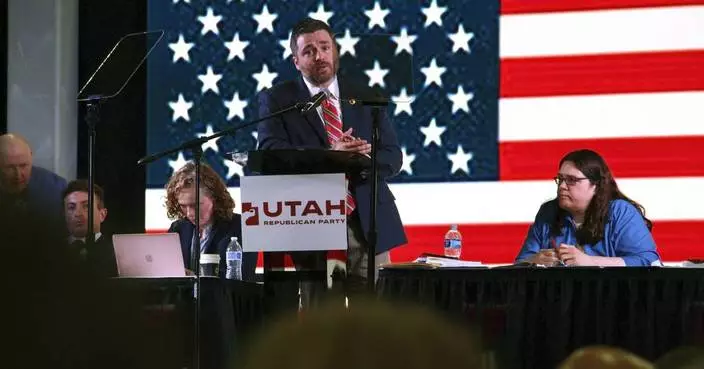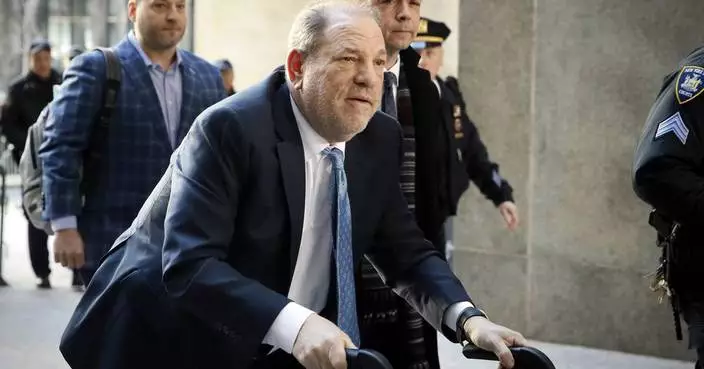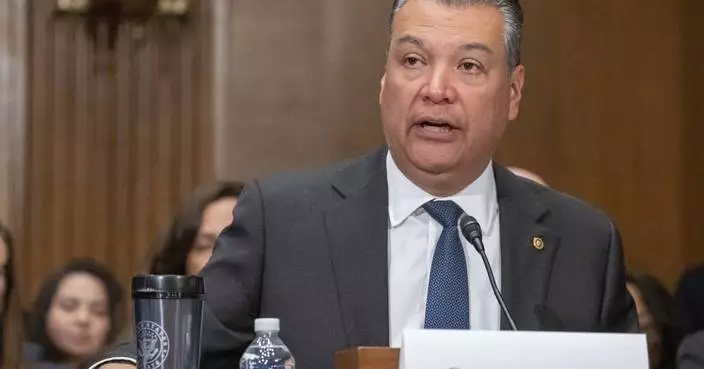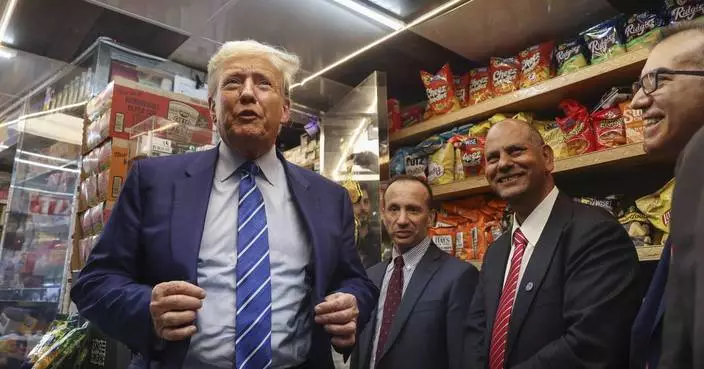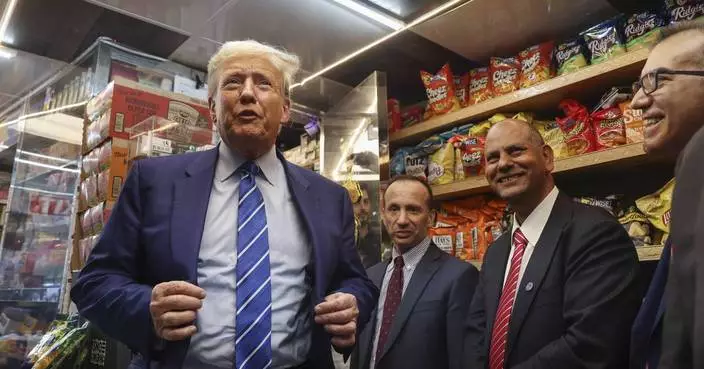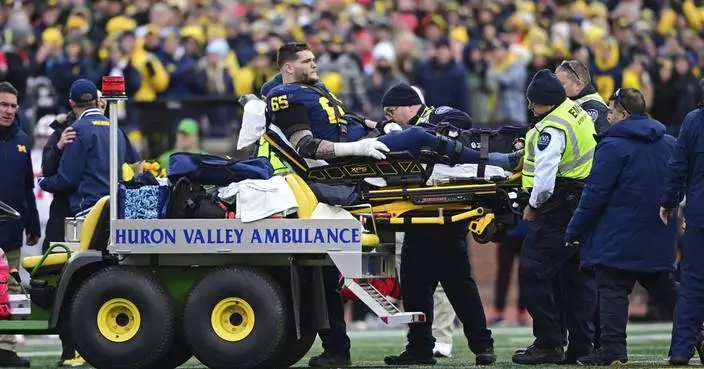Rashon Nelson initially brushed it off when the Starbucks manager told him he couldn't use the restroom because he wasn't a paying customer.
He thought nothing of it when he and his childhood friend and business partner, Donte Robinson, were approached at their table and were asked if they needed help. The 23-year-old entrepreneurs declined, explaining they were just waiting for a business meeting.
Click to Gallery
Rashon Nelson initially brushed it off when the Starbucks manager told him he couldn't use the restroom because he wasn't a paying customer.
In this Wednesday, April 18, 2018 photo, Rashon Nelson, left, and Donte Robinson, right, laugh during an interview with The Associated Press in Philadelphia. Their arrests at a local Starbucks quickly became a viral video and galvanized people around the country who saw the incident as modern-day racism. In the week since, Nelson and Robinson have met with Starbucks CEO Kevin Johnson and are pushing for lasting changes to ensure that what happened to them doesn't happen to future patrons. (AP Photo/Jacqueline Larma)
In this Wednesday, April 18, 2018 photo, Rashon Nelson, left, and Donte Robinson, right, listen to a reporter's question during an interview with The Associated Press in Philadelphia. Their arrests at a local Starbucks quickly became a viral video and galvanized people around the country who saw the incident as modern-day racism. In the week since, Nelson and Robinson have met with Starbucks CEO Kevin Johnson and are pushing for lasting changes to ensure that what happened to them doesn't happen to future patrons. (AP Photo/Jacqueline Larma)
A few minutes later, they hardly noticed when the police came into the coffee shop — until officers started walking in their direction.
In this Wednesday, April 18, 2018 photo, Rashon Nelson, left, speaks as Donte Robinson, looks on during an interview with The Associated Press in Philadelphia. Their arrests at a local Starbucks quickly became a viral video and galvanized people around the country who saw the incident as modern-day racism. In the week since, Nelson and Robinson have met with Starbucks CEO Kevin Johnson and are pushing for lasting changes to ensure that what happened to them doesn't happen to future patrons. (AP Photo/Jacqueline Larma)
In this Wednesday, April 18, 2018 photo, Stewart Cohen, an attorney representing Rashon Nelson and Donte Robinson, said the men were illegally profiled during an interview with The Associated Press in Philadelphia. The arrests of Nelson and Robinson at a local Starbucks quickly became a viral video and galvanized people around the country who saw the incident as modern-day racism. (AP Photo/Jacqueline Larma)
Nelson and Robinson said they went to the Starbucks to meet Andrew Yaffe, a white local businessman, over a potential real estate opportunity. Three officers showed up not long after. Nelson said they weren't questioned but were told to leave immediately.
Philadelphia Police Commissioner Richard Ross speaks to the media during a news conference, Thursday, April 19, 2018 in Philadelphia. Ross apologized to the two black men who were arrested at a Starbucks, saying that the issue of race is not lost on him and he shouldn't be the person making things worse. (David Swanson/The Philadelphia Inquirer via AP)
In this Wednesday, April 18, 2018 photo, Donte Robinson listens to a reporter's question during an interview with the Associated Press in Philadelphia. His arrest, along with Rashon Nelson at a local Starbucks quickly became a viral video and galvanized people around the country who saw the incident as modern-day racism. In the week since, Nelson and Robinson have met with Starbucks CEO Kevin Johnson and are pushing for lasting changes to ensure that what happened to them doesn't happen to future patrons. (AP Photo/Jacqueline Larma)
In this April 18, 2018 photo, Rashon Nelson, left, speaks as Donte Robinson, right, looks on during an interview with The Associated Press in Philadelphia. Their arrests at a local Starbucks quickly became a viral video and galvanized people around the country who saw the incident as modern-day racism. In the week since, Nelson and Robinson have met with Starbucks CEO Kevin Johnson and are pushing for lasting changes to ensure that what happened to them doesn't happen to future patrons. (AP Photo/Jacqueline Larma)
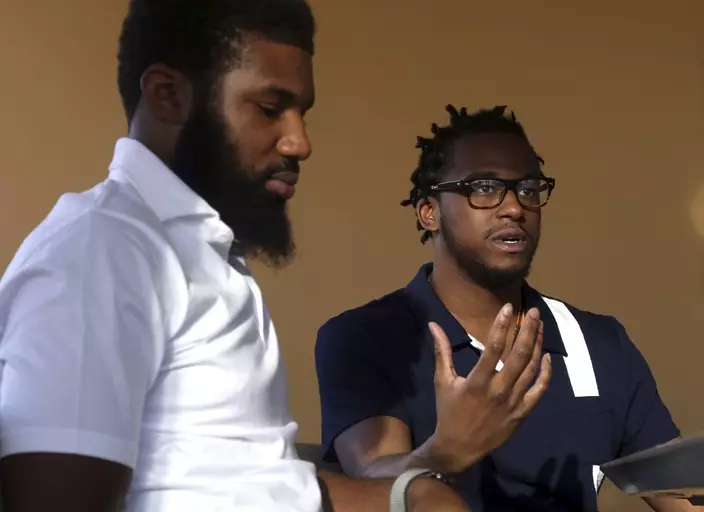
In this Wednesday, April 18, 2018 photo, Rashon Nelson, left, listens as and Donte Robinson, right, addresses a reporter's question during an interview with The Associated Press in Philadelphia. Their arrests at a local Starbucks quickly became a viral video and galvanized people around the country who saw the incident as modern-day racism. In the week since, Nelson and Robinson have met with Starbucks CEO Kevin Johnson and are pushing for lasting changes to ensure that what happened to them doesn't happen to future patrons. (AP Photo/Jacqueline Larma)

In this Wednesday, April 18, 2018 photo, Rashon Nelson, left, and Donte Robinson, right, laugh during an interview with The Associated Press in Philadelphia. Their arrests at a local Starbucks quickly became a viral video and galvanized people around the country who saw the incident as modern-day racism. In the week since, Nelson and Robinson have met with Starbucks CEO Kevin Johnson and are pushing for lasting changes to ensure that what happened to them doesn't happen to future patrons. (AP Photo/Jacqueline Larma)
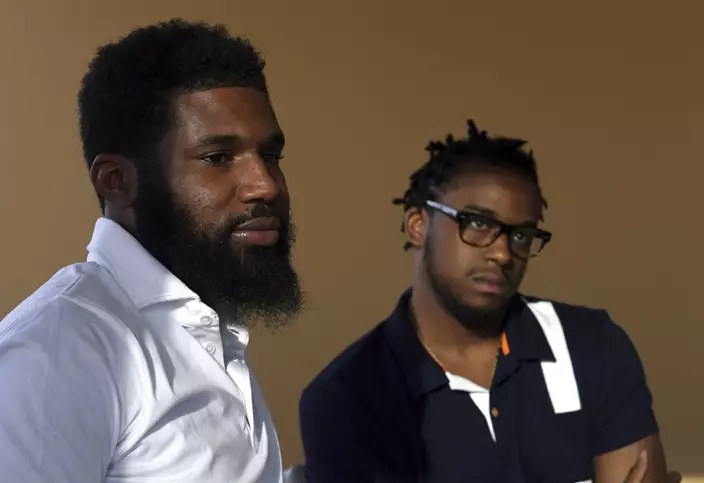
In this Wednesday, April 18, 2018 photo, Rashon Nelson, left, and Donte Robinson, right, listen to a reporter's question during an interview with The Associated Press in Philadelphia. Their arrests at a local Starbucks quickly became a viral video and galvanized people around the country who saw the incident as modern-day racism. In the week since, Nelson and Robinson have met with Starbucks CEO Kevin Johnson and are pushing for lasting changes to ensure that what happened to them doesn't happen to future patrons. (AP Photo/Jacqueline Larma)
A few minutes later, they hardly noticed when the police came into the coffee shop — until officers started walking in their direction.
"That's when we knew she called the police on us," Nelson told The Associated Press in the first interview by the two black men since video of their April 12 trespassing arrests touched off a furor around the U.S. over racial profiling or what has been dubbed "retail racism" or "shopping while black."
Nelson and Robinson were led away in handcuffs from the shop in the city's well-to-do Rittenhouse Square neighborhood in an incident recorded on a white customer's cellphone.
In the week since, the men have met with Starbucks' apologetic CEO and have started pushing for lasting change at the coffee shop chain, including new policies on discrimination and ejecting customers.
"We do want to make sure it doesn't happen to anybody again," Robinson said. "What if it wasn't us sitting there? What if it was the kid that didn't know somebody that knew somebody? Do they make it to jail? Do they die? What happens?"
On Thursday, they also got an apology from Philadelphia police Commissioner Richard Ross, a black man who at first staunchly defended his officers' handling of the encounter.
"I should have said the officers acted within the scope of the law, and not that they didn't do anything wrong," Ross said. "Words are very important."
At a news conference, a somber Ross said he "failed miserably" in addressing the arrests. He said that the issue of race is not lost on him and that he shouldn't be the person making things worse.
"Shame on me if, in any way, I've done that," he said.
He also said the police department did not have a policy for dealing for such situations but does now and it will be released soon.
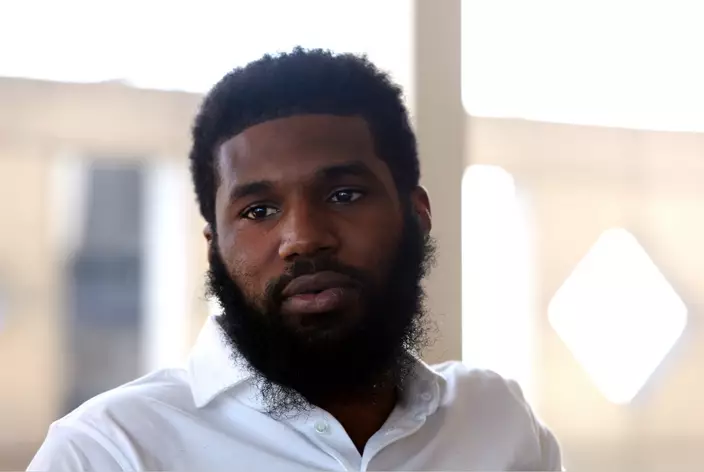
In this Wednesday, April 18, 2018 photo, Rashon Nelson responds to a reporter's question during an interview with The Associated Press in Philadelphia. His arrest, along with Donte Robinson, at a local Starbucks quickly became a viral video and galvanized people around the country who saw the incident as modern-day racism. In the week since, Nelson and Robinson have met with Starbucks CEO Kevin Johnson and are pushing for lasting changes to ensure that what happened to them doesn't happen to future patrons. (AP Photo/Jacqueline Larma)
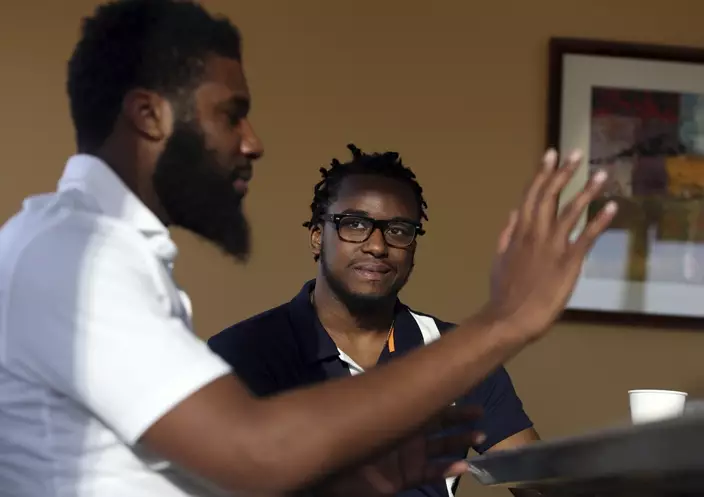
In this Wednesday, April 18, 2018 photo, Rashon Nelson, left, speaks as Donte Robinson, looks on during an interview with The Associated Press in Philadelphia. Their arrests at a local Starbucks quickly became a viral video and galvanized people around the country who saw the incident as modern-day racism. In the week since, Nelson and Robinson have met with Starbucks CEO Kevin Johnson and are pushing for lasting changes to ensure that what happened to them doesn't happen to future patrons. (AP Photo/Jacqueline Larma)
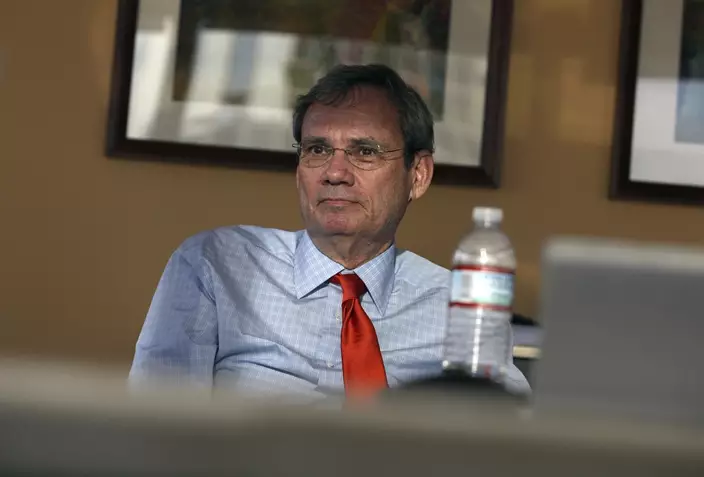
In this Wednesday, April 18, 2018 photo, Stewart Cohen, an attorney representing Rashon Nelson and Donte Robinson, said the men were illegally profiled during an interview with The Associated Press in Philadelphia. The arrests of Nelson and Robinson at a local Starbucks quickly became a viral video and galvanized people around the country who saw the incident as modern-day racism. (AP Photo/Jacqueline Larma)
Nelson and Robinson said they went to the Starbucks to meet Andrew Yaffe, a white local businessman, over a potential real estate opportunity. Three officers showed up not long after. Nelson said they weren't questioned but were told to leave immediately.
Yaffe showed up as the men were being handcuffed and could be seen in the video demanding an explanation for the officers' actions. Nelson and Robinson did not resist arrest.
"When you know that you did nothing wrong, how do you really react to it?" Nelson said. "You can either be ignorant or you can show some type of sophistication and act like you have class. That was the choice we had."
It was not their first encounter with police. But neither had been arrested before, setting them apart from many of those they grew up with in their gritty southwest Philadelphia neighborhood.
Nelson and Robinson spent hours in a jail cell and were released after midnight, when the district attorney declined to prosecute them.
Nelson said he wondered if he'd make it home alive.
"Any time I'm encountered by cops, I can honestly say it's a thought that runs through my mind," Nelson said. "You never know what's going to happen."
Starbucks has said the coffee shop where the arrests occurred has a policy that restrooms are for paying customers only, but the company has no overall policy. The men's attorney, Stewart Cohen, said they were illegally profiled.
The arrests prompted protests at the Starbucks and a national boycott. Kevin Johnson, CEO of the Seattle-based company, came to Philadelphia to meet with the men, called the arrests "reprehensible" and ordered more than 8,000 Starbucks stores closed on the afternoon of May 29 so that nearly 175,000 employees can receive training on unconscious bias. Starbucks has not identified the employee who called police.
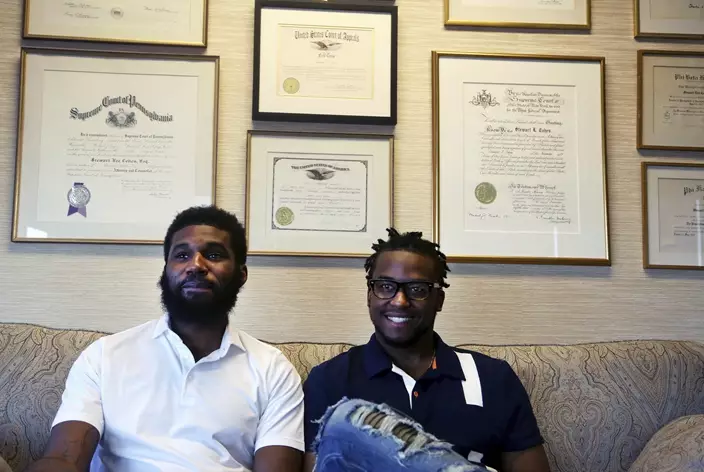
In this Wednesday April 18, 2018 photo, Rashon Nelson, left, and Donte Robinson, right, sit on their attorney's sofa as they pose for a portrait following an interview with The Associated Press in Philadelphia. Their arrests at a local Starbucks quickly became a viral video and galvanized people around the country who saw the incident as modern-day racism. In the week since, Nelson and Robinson have met with Starbucks CEO Kevin Johnson and are pushing for lasting changes to ensure that what happened to them doesn't happen to future patrons. (AP Photo/Jacqueline Larma)
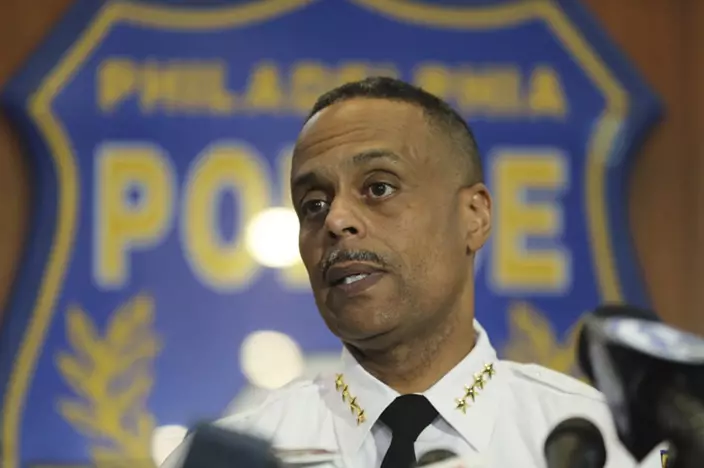
Philadelphia Police Commissioner Richard Ross speaks to the media during a news conference, Thursday, April 19, 2018 in Philadelphia. Ross apologized to the two black men who were arrested at a Starbucks, saying that the issue of race is not lost on him and he shouldn't be the person making things worse. (David Swanson/The Philadelphia Inquirer via AP)
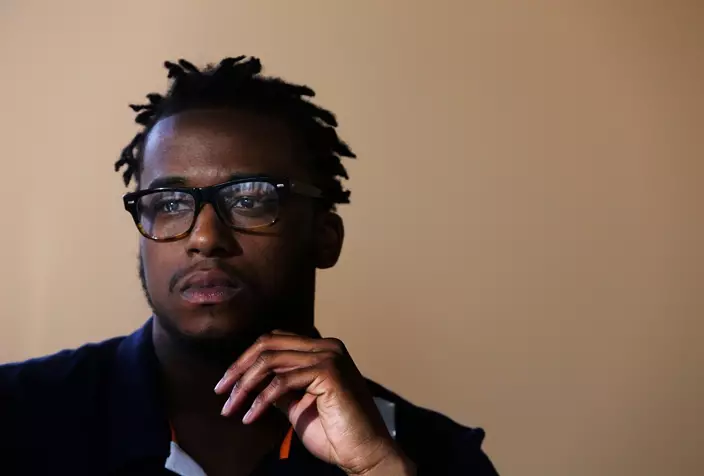
In this Wednesday, April 18, 2018 photo, Donte Robinson listens to a reporter's question during an interview with the Associated Press in Philadelphia. His arrest, along with Rashon Nelson at a local Starbucks quickly became a viral video and galvanized people around the country who saw the incident as modern-day racism. In the week since, Nelson and Robinson have met with Starbucks CEO Kevin Johnson and are pushing for lasting changes to ensure that what happened to them doesn't happen to future patrons. (AP Photo/Jacqueline Larma)
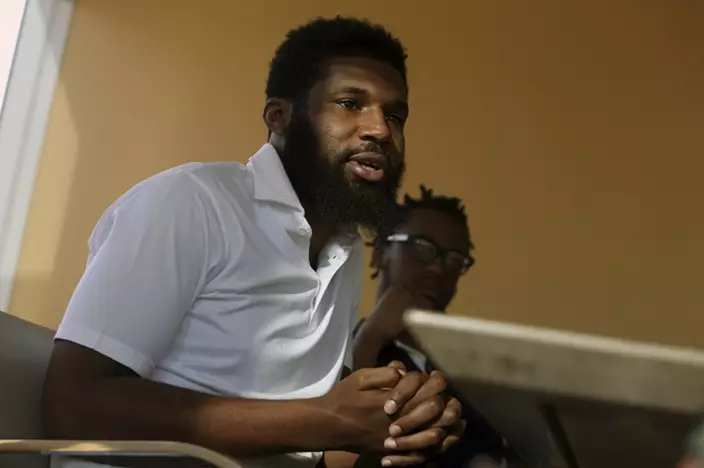
In this April 18, 2018 photo, Rashon Nelson, left, speaks as Donte Robinson, right, looks on during an interview with The Associated Press in Philadelphia. Their arrests at a local Starbucks quickly became a viral video and galvanized people around the country who saw the incident as modern-day racism. In the week since, Nelson and Robinson have met with Starbucks CEO Kevin Johnson and are pushing for lasting changes to ensure that what happened to them doesn't happen to future patrons. (AP Photo/Jacqueline Larma)
Robinson said that he appreciates the public support but that anger and boycotting Starbucks are not the solution.
The men said they are looking for more lasting results and are in mediation with Starbucks to make changes, including the posting in stores of a customer bill of rights; the adoption of new policies on customer ejections and racial discrimination; and independent investigations of complaints.
"You go from being someone who's just trying to be an entrepreneur, having your own dreams and aspirations, and then this happens," Nelson said. "How do you handle it? Do you stand up? Do you fight? Do you sit down and just watch everyone else fight for you? Do you let it slide, like we let everything else slide with injustice?"
No woman had ever preached the keynote sermon at the Joint National Baptist Convention, a gathering of four historically Black Baptist denominations representing millions of people.
That changed in January when the Rev. Gina Stewart took the convention stage in Memphis, Tennessee, — the Southern city home to Christ Missionary Baptist Church where she serves as senior pastor — and delivered a rousing message, asserting that Jesus not only included women in his ministry, but identified with their suffering.
But what happened next put a spotlight on the obstacles women in Christian ministry continue to face as they carve out leadership space within the patriarchal culture of the Black Church in America. Several women pastors told The Associated Press that it should serve as the breaking point.
“This is an example of no matter how high you rise as a woman, you’re going to meet patriarchy at the top of the hill,” said Martha Simmons, founder of Women of Color in Ministry, which helps women navigate the process of getting ordained. “The next Norton Anthology of African American preaching is probably 20 years away, but that sermon will be in there.”
Despite the enthusiastic reception for Stewart, the original recording of her historic sermon disappeared from the convention’s Facebook page, setting off a social media firestorm – driven mostly by women – protesting its removal. A recording of the sermon later appeared, but it was followed by accusations the convention edited her closing remarks, which challenges the four allied denominations to support women in ministry.
National Baptist Convention, USA, President Jerry Young did not reply to requests from The Associated Press for comment. He said at another January meeting that he believed the Facebook page had been hacked and he planned to involve the FBI.
“I still don’t know what happened with the sermon, but what is clear is that this was a form of erasure,” Stewart said. “I was just as shocked, stunned and surprised as everyone else.”
It is symptomatic of a larger problem, according to several Black women pastors interviewed by the AP. They emphasized how they were worn down by the physical and psychological toll of working in a male-dominated culture.
In some denominations, women have made progress. The African Methodist Episcopal Church estimates that one-fourth of its total staff are women, including 1,052 ordained ministers.
In the Black Church as a whole, male pastors predominate, though there’s no comprehensive gender breakdown. Simmons estimates that less than one in 10 Black Protestant congregations are led by a woman, even as more Black women are attending seminary.
The conditions aren’t new, but the public discourse over women’s equality in ministry has rapidly gained ground due in large part to the bullhorn social media provides, said Courtney Pace, scholar-in-residence with Memphis-based Equity for Women in the Church. Pace noted how Facebook afforded Eboni Marshall Turman a venue to publicly share her grievances before filing a gender discrimination lawsuit in December against Abyssinian Baptist Church in New York.
The late theologian and civil rights activist Prathia Hall underscores this dynamic, said Pace, who wrote “Freedom Faith: The Womanist Vision of Prathia Hall.” In the book, she details how Hall was a key inspiration for Martin Luther King Jr.’s “I Have a Dream” speech.
“The kind of thing that happened to Gina Stewart happened a lot to Prathia Hall,” Pace said. “When she was doing her work, we did not have social media, or cell phones with voice recorders and cameras in every hand. So who knows what the response to Prathia would have been with an empowered public like we have today.”
Hall was born in Philadelphia in 1940, the daughter of a Baptist preacher. As a youth, she took part in local speech competitions where she melded folk religion and liberation theology.
But not all of Hall’s relationships within the insular preaching fraternity of the National Baptist Convention were as collegial as her relationship with King, whom she said in later years did more with “I have a dream” than she could have.
Many theologically conservative Christian churches, including some Black Protestant denominations, prohibit women from preaching. They frequently cite certain biblical passages, including one they interpret as saying women ought to “be silent” in churches. Even in denominations without explicit bans, women with leadership aspirations often must contend with a patriarchal culture.
Last month, the audience was dotted with young Black women at an event hosted at the Howard Divinity School in Washington. A group convened a panel about the evolution of Black women’s role in the church.
Inside the cavernous Dunbarton Chapel that Howard Divinity shares with the Howard School of Law, a half-dozen Black women representing a range of independent churches and Black Protestant denominations spoke about persevering through instability and transition.
Their current duties, some of the women said, left them exhausted and unable to grieve the members they lost to COVID-19.
One speaker was the Rev. Lyvonne Briggs. In 2019, she was being overworked and underpaid as an assistant pastor of a large Baptist church in California. Her marriage dissolved.
She restarted her life in Atlanta. During the lockdown one Sunday morning in her apartment, Briggs went live on Instagram and held a self-styled worship space for 25 people to share their experiences. It became known as The Proverbial Experience, which Briggs describes as an “African-centered, womanist series of spiritual gatherings to nourish the soul.”
In two years, Briggs grew her church into a digital community of 3,000. She also wrote “Sensual Faith: The Spiritual Art of Coming Back to Your Body,” a treatise on liberation from the sexual politics and objectification of Black women’s bodies in the church setting.
“I don’t ascribe to this idea that the Black Church is dead,” Briggs told the AP. “But I do acknowledge and promote that we have to eulogize what it used to be so that we can birth something new.”
One preacher who fashions himself an expert on the topic of women’s role in the church, Walter Gardner of the Newark Church of Christ in Newark, N.J, sent a video link of one of his lectures when queried by the AP about his beliefs. At the end of one session, Gardner suggested that women, overall, ignore Scripture and are incapable of being taught.
That’s a mindset Gina Stewart would like to change, on behalf of future generations of Black women.
“I would hope that we can knock down some of those barriers so that their journey would be just a little bit easier,” said Stewart, who has continued to charge forward.
In a given week, her preaching schedule can take her to multiple cities. As an example, she traveled to Washington earlier this month after accepting a sought-after invitation to preach at Howard University’s Andrew Rankin Memorial Chapel.
Stewart's goals mesh with those of Eboni Marshall Turman, who gave the Martin Luther King Jr. Crown Forum lecture in February at Martin Luther King’s alma mater, Morehouse College. In December, after not being named a finalist, she had sued Abyssinian Baptist Church and its pulpit search committee for gender discrimination over its hiring process for its next senior pastor, an assertion the church and the committee disputed. No woman has ever held the post.
A former Abyssinian assistant minister, the Rev. Rashad Raymond Moore, said in an email to The Associated Press that of the several dozen applicants for the senior pastor job, “none were more exciting, promising and refreshing than Eboni Marshall Turman.”
Added Moore, who now is pastor of New York City’s First Baptist Church of Crown Heights, “Pastoral searches in Black congregations, historically socially conservative, are often mired in the politics of discrimination, including biases based on gender, sexual orientation, marital status and age.”
Marshall Turman, a Yale Divinity School professor, offered pointed critiques in her first book at what she deemed the inherent patriarchy of Morehouse’s social gospel justice tradition. She adapted her recent lecture’s title from the last speech ever given by King, the all-male college’s most famous alumni.
The title was blunt: “I’m Not Fearing Any Man.”
Associated Press religion coverage receives support through the AP’s collaboration with The Conversation US, with funding from Lilly Endowment Inc. The AP is solely responsible for this content.
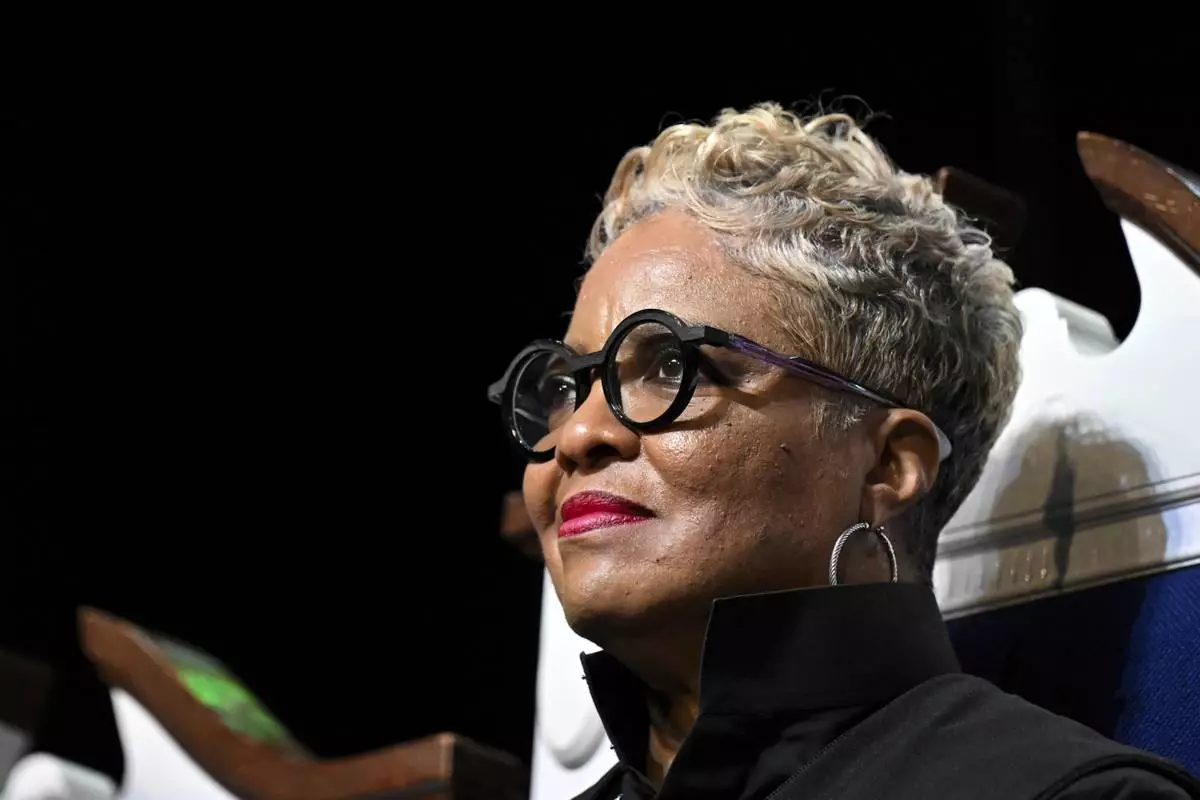
Rev. Gina Stewart looks on during church service at Rankin Chapel, Sunday, April 7, 2024, in Washington. Throughout its long history, the Black Church in America has, for the most part, been a patriarchal institution. Now, more Black women are taking on high-profile leadership roles. But the founder of Women of Color in Ministry estimates that less than one in 10 Black Protestant congregations are led by a woman. “I would hope that we can knock down some of those barriers so that their journey would be just a little bit easier,” said Stewart. (AP Photo/Terrance Williams)
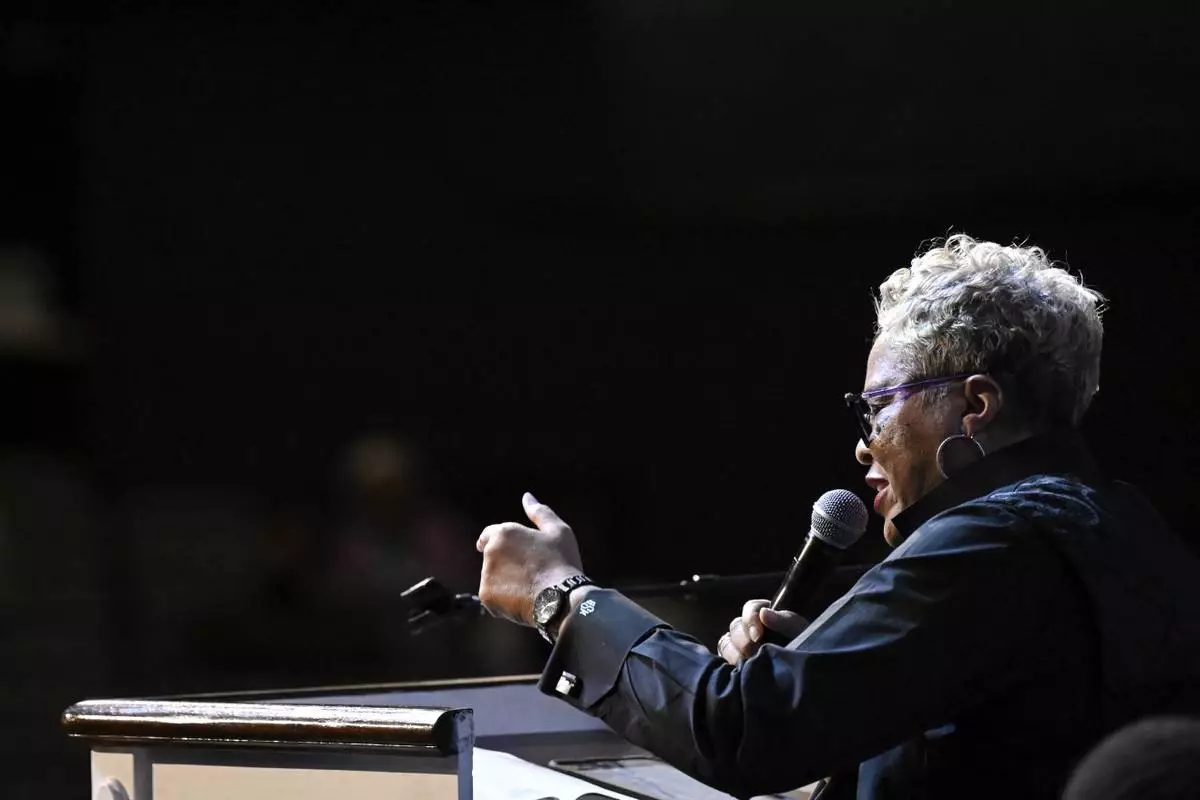
Rev. Gina Stewart preaches during church service at Rankin Chapel, Sunday, April 7, 2024, in Washington. Throughout its long history, the Black Church in America has, for the most part, been a patriarchal institution. Now, more Black women are taking on high-profile leadership roles. But the founder of Women of Color in Ministry estimates that less than one in 10 Black Protestant congregations are led by a woman. “I would hope that we can knock down some of those barriers so that their journey would be just a little bit easier,” said Stewart. (AP Photo/Terrance Williams)
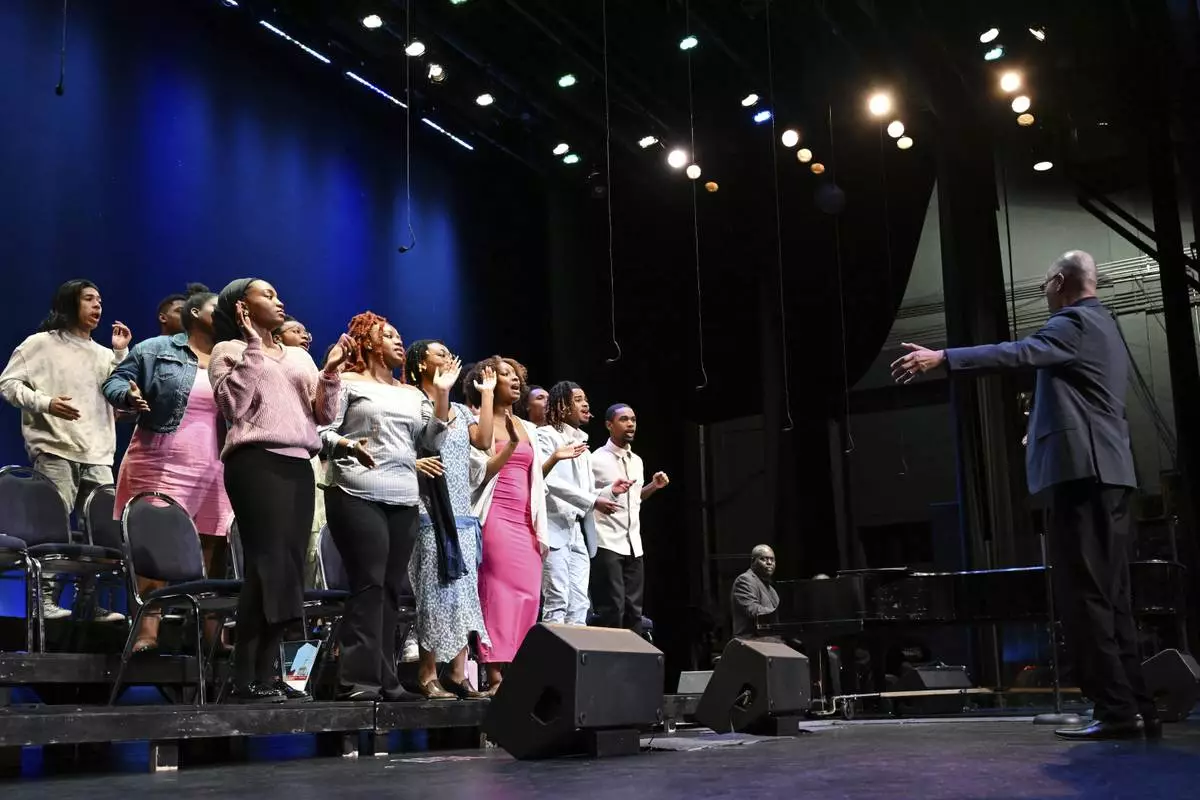
The Howard University gospel choir performs during church service at Rankin Chapel, Sunday, April 7, 2024, in Washington. Throughout its long history, the Black Church in America has, for the most part, been a patriarchal institution. Now, more Black women are taking on high-profile leadership roles. But the founder of Women of Color in Ministry estimates that less than one in 10 Black Protestant congregations are led by a woman. “I would hope that we can knock down some of those barriers so that their journey would be just a little bit easier,” said Stewart. (AP Photo/Terrance Williams)
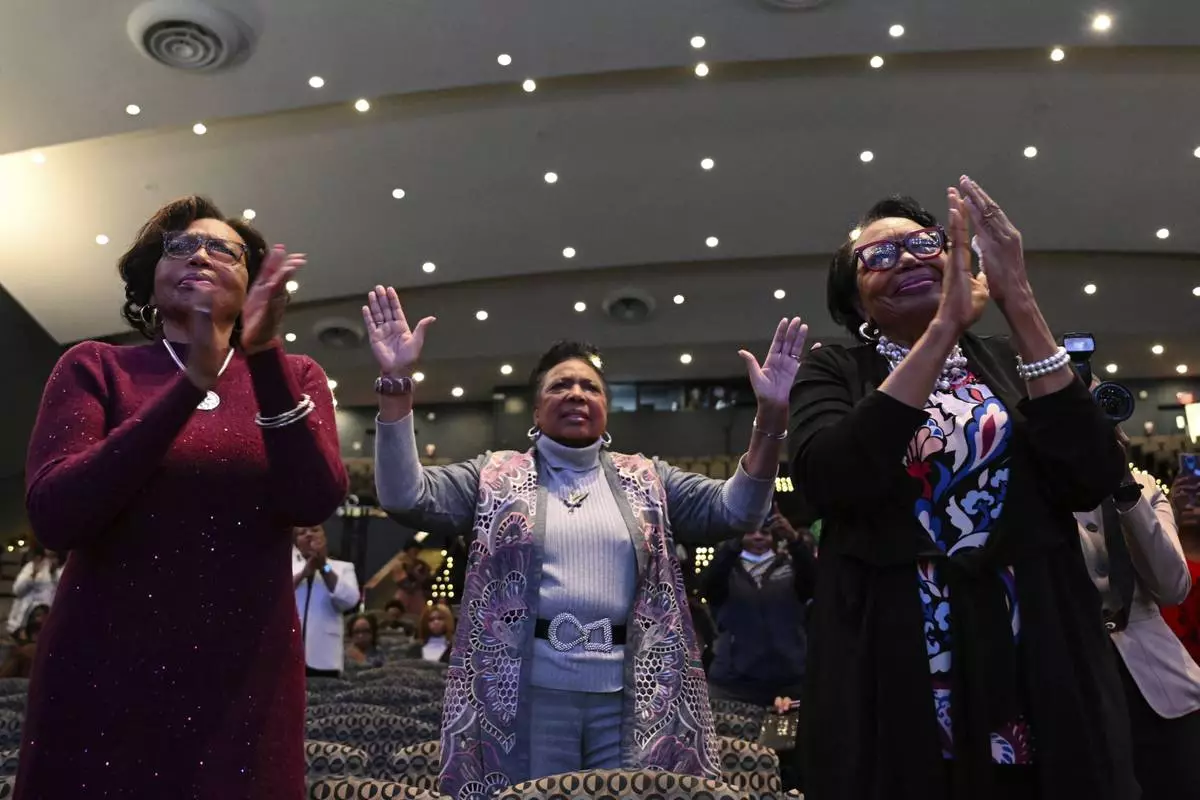
Parishioners clap and raise their hands as Rev. Gina Stewart preaches during church service at Rankin Chapel, Sunday, April 7, 2024, in Washington. Throughout its long history, the Black Church in America has, for the most part, been a patriarchal institution. Now, more Black women are taking on high-profile leadership roles. But the founder of Women of Color in Ministry estimates that less than one in 10 Black Protestant congregations are led by a woman. “I would hope that we can knock down some of those barriers so that their journey would be just a little bit easier,” said Stewart. (AP Photo/Terrance Williams)
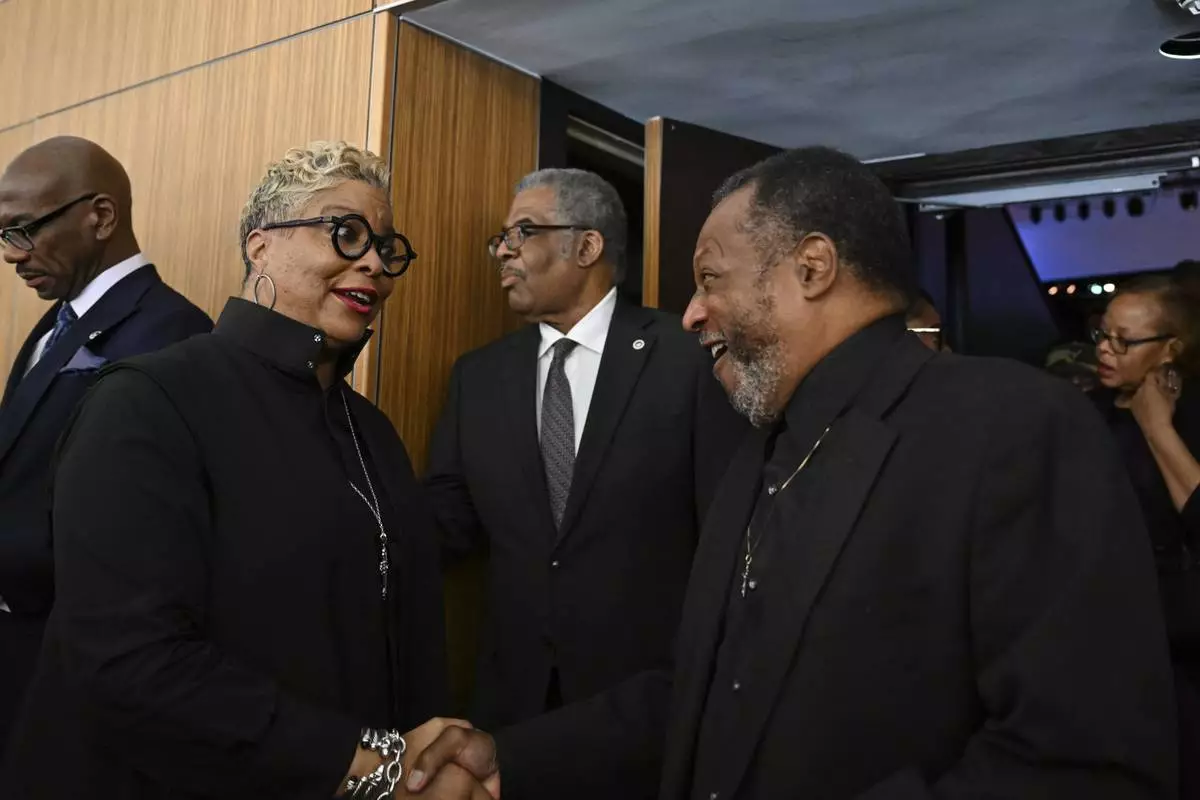
Rev. Gina Stewart, left, greets a parishioner after church service at Rankin Chapel, Sunday, April 7, 2024, in Washington. Throughout its long history, the Black Church in America has, for the most part, been a patriarchal institution. Now, more Black women are taking on high-profile leadership roles. But the founder of Women of Color in Ministry estimates that less than one in 10 Black Protestant congregations are led by a woman. “I would hope that we can knock down some of those barriers so that their journey would be just a little bit easier,” said Stewart. (AP Photo/Terrance Williams)
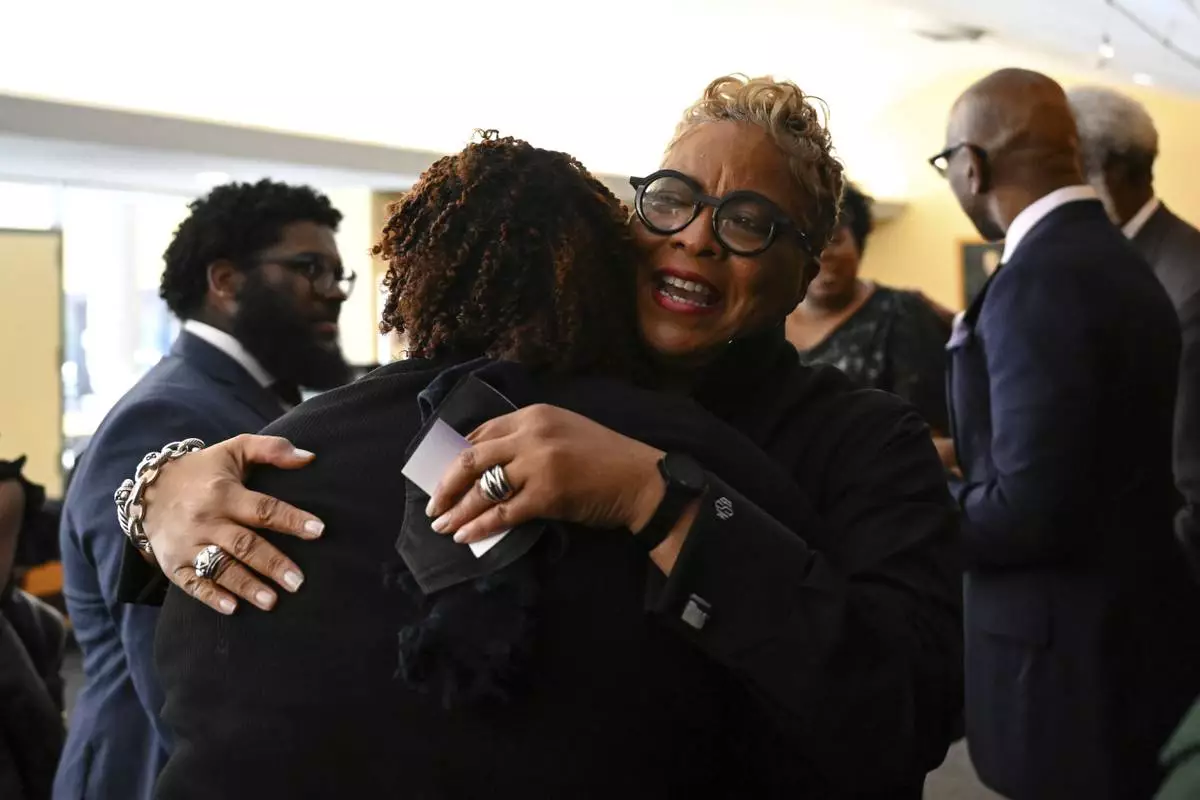
Rev. Gina Stewart, right, hugs a parishioner after church service at Rankin Chapel, Sunday, April 7, 2024, in Washington. Throughout its long history, the Black Church in America has, for the most part, been a patriarchal institution. Now, more Black women are taking on high-profile leadership roles. But the founder of Women of Color in Ministry estimates that less than one in 10 Black Protestant congregations are led by a woman. “I would hope that we can knock down some of those barriers so that their journey would be just a little bit easier,” said Stewart. (AP Photo/Terrance Williams)
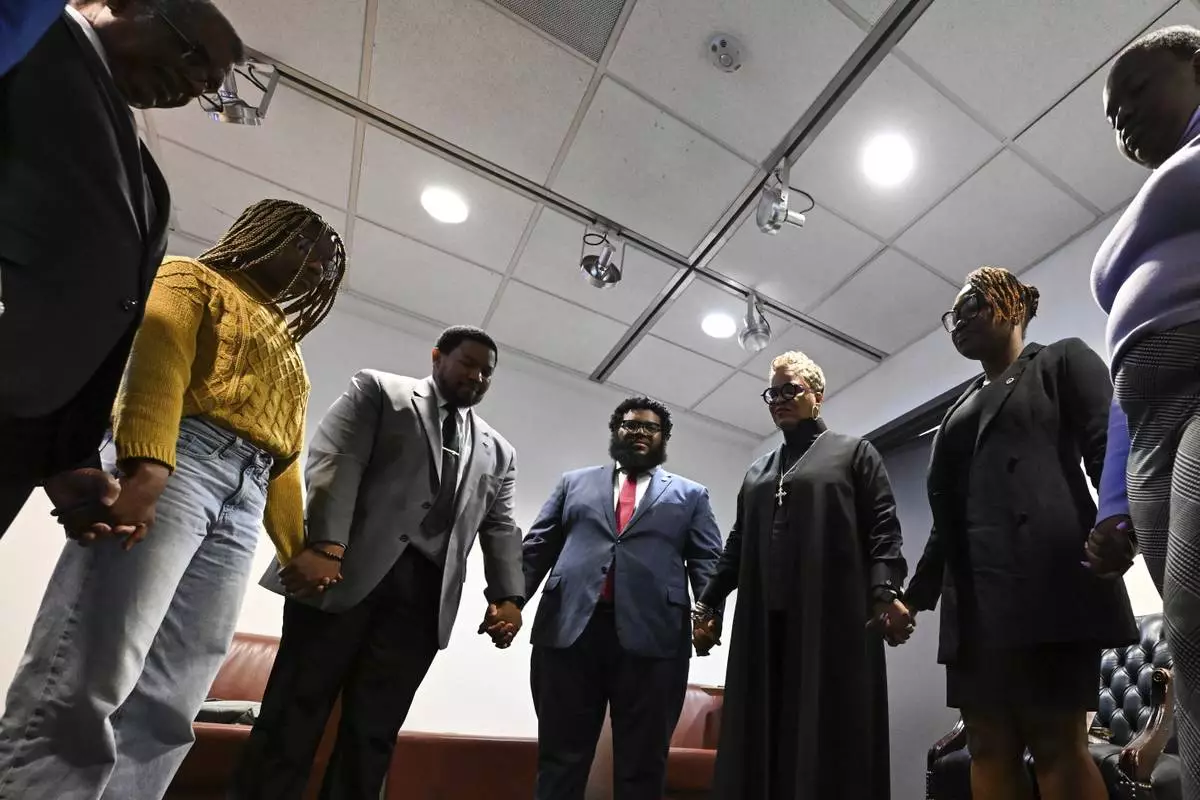
Rev. Gina Stewart, third from right, holds hands with students and faculty of Howard University before church service at Rankin Chapel, Sunday, April 7, 2024, in Washington. Throughout its long history, the Black Church in America has, for the most part, been a patriarchal institution. Now, more Black women are taking on high-profile leadership roles. But the founder of Women of Color in Ministry estimates that less than one in 10 Black Protestant congregations are led by a woman. “I would hope that we can knock down some of those barriers so that their journey would be just a little bit easier,” said Stewart. (AP Photo/Terrance Williams)
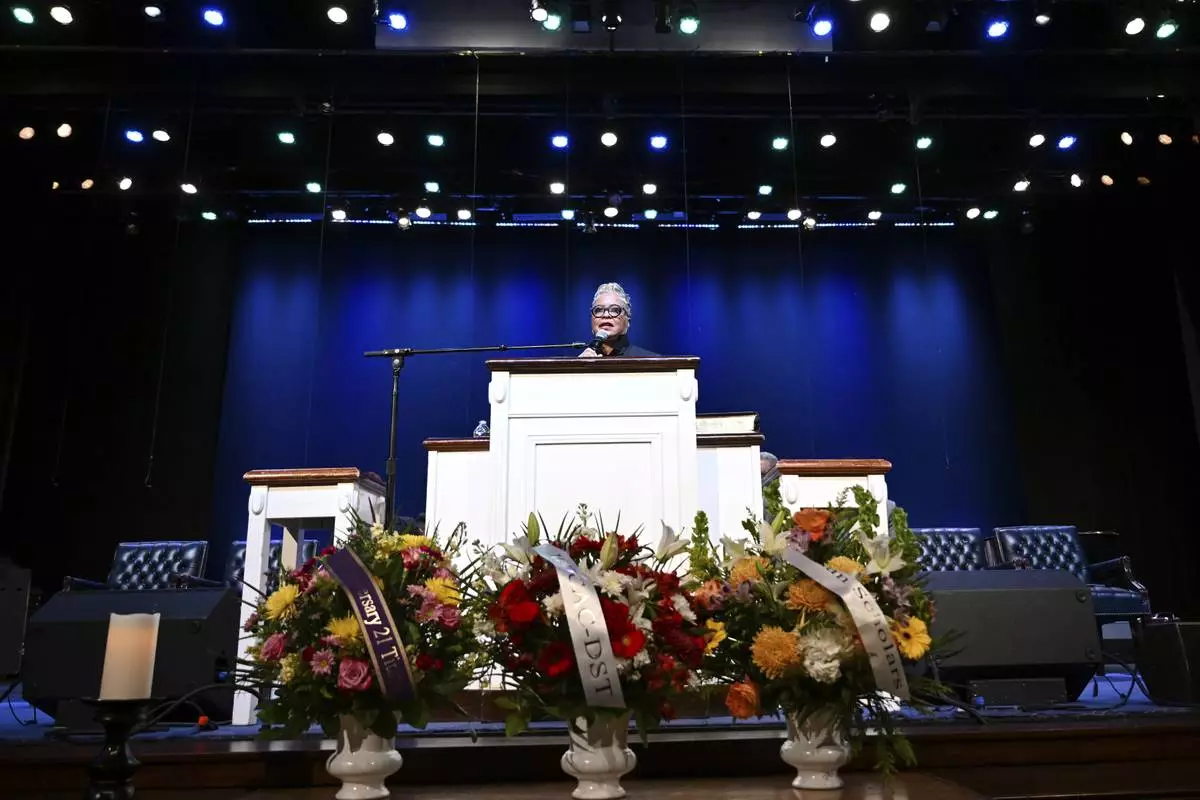
Rev. Gina Stewart preaches during church service at Rankin Chapel, Sunday, April 7, 2024, in Washington.Throughout its long history, the Black Church in America has, for the most part, been a patriarchal institution. Now, more Black women are taking on high-profile leadership roles. But the founder of Women of Color in Ministry estimates that less than one in 10 Black Protestant congregations are led by a woman. “I would hope that we can knock down some of those barriers so that their journey would be just a little bit easier,” said Stewart. (AP Photo/Terrance Williams)
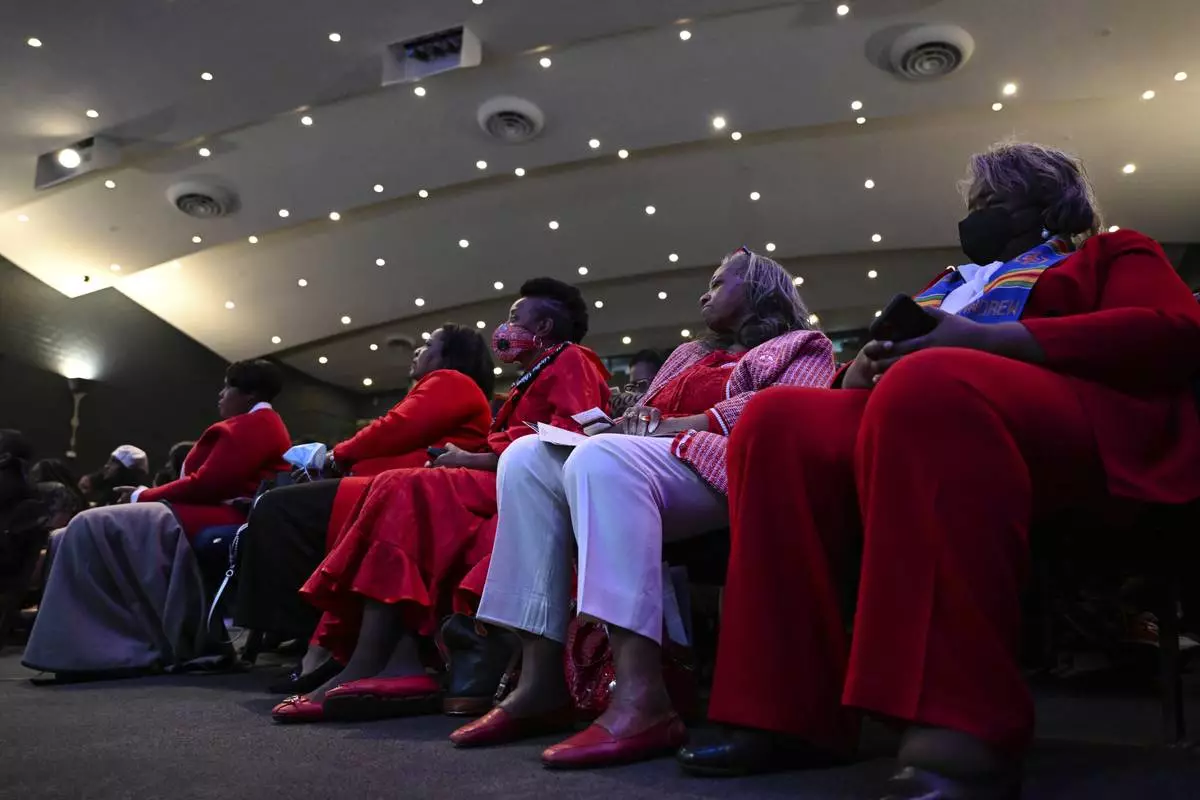
Alumni members of Delta Sigma Theta sorority watch Rev. Gina Stewart preach during church service at Rankin Chapel, Sunday, April 7, 2024, in Washington. Throughout its long history, the Black Church in America has, for the most part, been a patriarchal institution. Now, more Black women are taking on high-profile leadership roles. But the founder of Women of Color in Ministry estimates that less than one in 10 Black Protestant congregations are led by a woman. “I would hope that we can knock down some of those barriers so that their journey would be just a little bit easier,” said Stewart. (AP Photo/Terrance Williams)
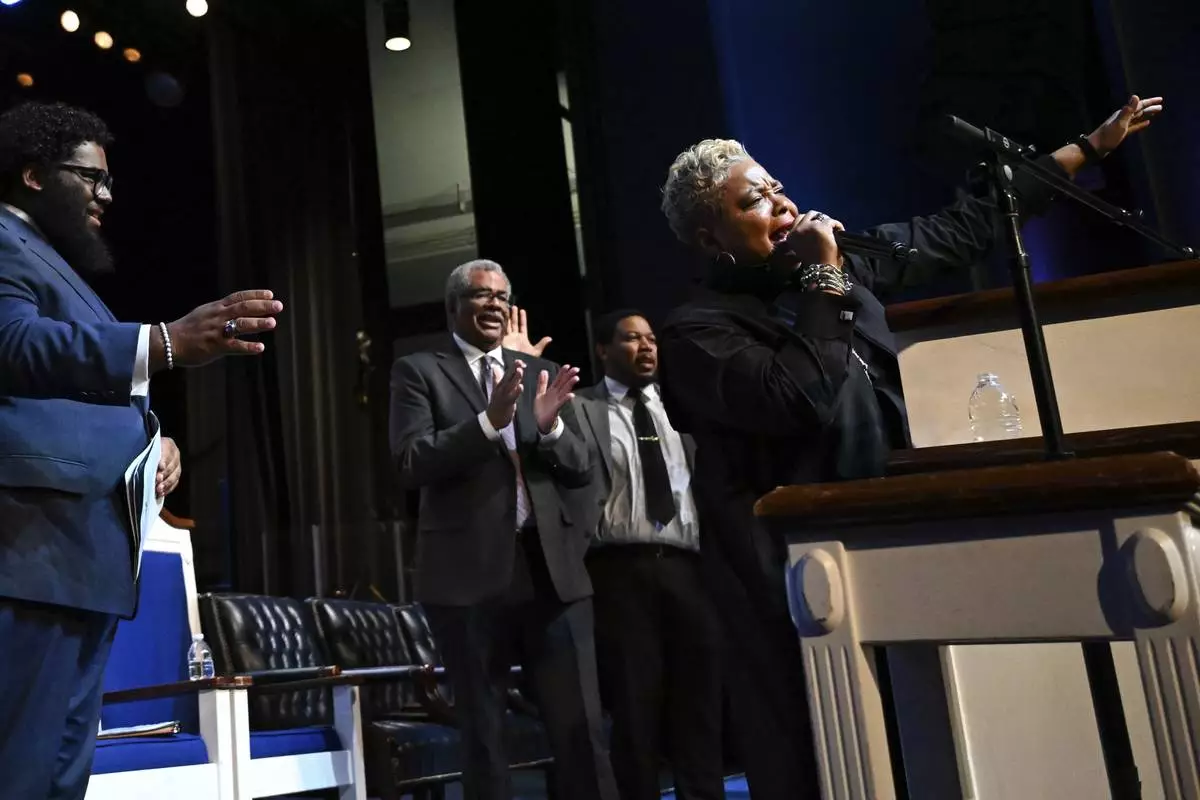
Rev. Gina Stewart, right, preaches during church service at Rankin Chapel, Sunday, April 7, 2024, in Washington. Throughout its long history, the Black Church in America has, for the most part, been a patriarchal institution. Now, more Black women are taking on high-profile leadership roles. But the founder of Women of Color in Ministry estimates that less than one in 10 Black Protestant congregations are led by a woman. “I would hope that we can knock down some of those barriers so that their journey would be just a little bit easier,” said Stewart. (AP Photo/Terrance Williams)
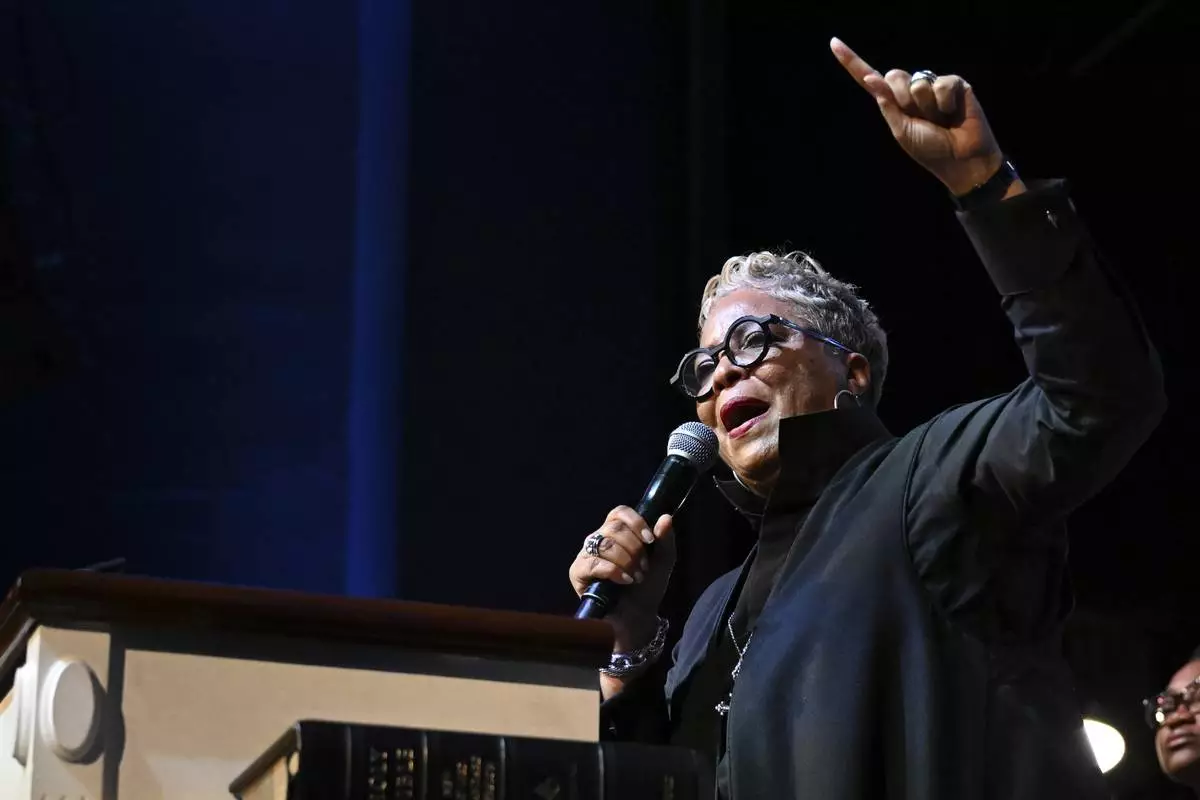
Rev. Gina Stewart preaches during church service at Rankin Chapel, Sunday, April 7, 2024, in Washington. Throughout its long history, the Black Church in America has, for the most part, been a patriarchal institution. Now, more Black women are taking on high-profile leadership roles. But the founder of Women of Color in Ministry estimates that less than one in 10 Black Protestant congregations are led by a woman. “I would hope that we can knock down some of those barriers so that their journey would be just a little bit easier,” said Stewart. (AP Photo/Terrance Williams)
























